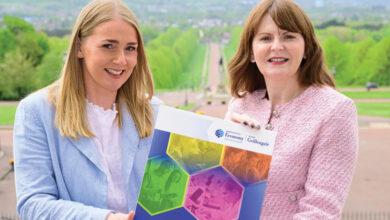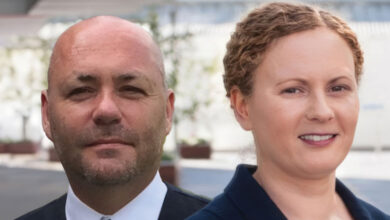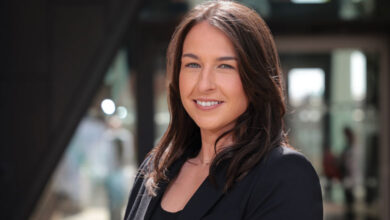The Big Society: Hugo Swire interview
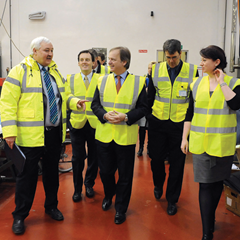 To Hugo Swire, the Big Society is a major culture shift to give power to citizens but critics claim the concept is shallow and disguises cuts.
To Hugo Swire, the Big Society is a major culture shift to give power to citizens but critics claim the concept is shallow and disguises cuts.
Peter Cheney discusses the idea with the NIO Minister.
Instead of a cover for cuts, Hugo Swire sees the Big Society as a kind of confession. The NIO Minister, who leads on the subject in the province, describes it as an admission that “big government can’t always do it, shouldn’t always do it and when it does things, it doesn’t always do it very well.”
He sums up David Cameron’s concept as a transfer of power from the state to local people so they have more of a say in how their lives are run. The fundamental belief is that “the people who do things best for their communities are those people who live in those communities themselves.”
The Minister earlier addressed the UK Association of Preservation Trusts’ national conference at the Crescent Arts Centre. The Big Society, he told delegates, had three pillars:
1. decreasing the power of Whitehall and bringing decisions much closer to people;
2. reforming and opening up public services; and
3. encouraging social action.
Ministers have been keen to stress that the Big Society already exists and they want to make it ‘bigger’.
The UK Government’s plans will have the most impact in England, where Westminster has a free hand. Elsewhere, it has financial levers but otherwise has to persuade devolved administrations. Some voluntary sector groups are supportive, others sceptical.
Cameron launched the name Big Society through the Guardian’s Hugo Young lecture, in November 2009, but has emphasised the same theme since his leadership election speech in October 2005: “We know we have a shared responsibility, that we’re all in this together, that there is such a thing as society; it’s just not the same thing as the state.”
That contrasted with Margaret Thatcher’s 1987 comment: “And who is society? There is no such thing.” Swire points interviewers to the full quote, which continues: “There are individual men and women and there are families and no government can do anything except through people and people look to themselves first.”
Transferring power from government, he thinks, is “rather radical” and not unique to Conservatives. Many of his party members in East Devon are involved in charities, churches and fundraising. So too are people from other political backgrounds: “We want to recognise those people. We want to support those people. We want to encourage those people and we want there to be more of those people.”
Critiques
“Our critics have to say something,” he says when rejecting Ed Miliband’s view of the Big Society as “a cloak for the small state”. Swire adds: “As a Conservative, I actually believe personally that it is the individuals who should be empowered against the state. If that’s radical, so be it.”
From the right wing, Adam Smith Institute Director Eamonn Butler says the idea is a ‘brand’ and any ‘good’ government policy will be called the Big Society. “I think that what that’s missing is the very clear things that we’re doing,” Swire responds, pointing to Big Society Capital and National Citizen Service.
“It’s actually a sort of philosophical change. It’s a mindset. It actually represents a very fundamental shift in thinking and I think, ultimately, will come to define David Cameron’s premiership.”
Charities, social enterprises, private companies and co-operatives (including those owned by public sector workers) will compete to run public services, at least in England.
The proposed Big Society Bank has been renamed Big Society Capital to distinguish it from high street banks and is due to operate from April 2012.
Big Society Capital will not make direct grants but will instead act as a wholesaler of capital, attracting funding from foundations, institutional investors, companies and private individuals, to invest in intermediary organisations. Applicants, from all parts of the UK, could approach the intermediary organisations and access capital at a more competitive rate than through a normal bank. Independent of government, the organisation will initially receive an estimated £400 million from dormant bank accounts and £200 million from HSBC, RBS, Lloyds and Barclays (so-called Merlin money).
Swire was most passionate about the National Citizen Service as, after the English riots, “if there was ever a time to give teenagers a sense of belonging and purpose, it is now.”
The service, piloted in England last summer, brings together 16-year olds from different social backgrounds for a residential trip. Similarly to the Duke of Edinburgh Awards, young people take part in outdoor pursuits, design a community project and carry out 30 hours of part-time social action. Ten thousand young people took part and the UK Government is discussing a Northern Ireland version with the Executive.
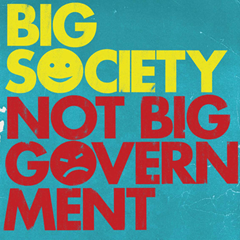 Whether or not that goes ahead, Swire notes that the province’s Big Society is “alive and well in myriad different forms”. Indeed, he brought David Cameron to see the ARC healthy living centre in Irvinestown back in June, a high profile illustration of Britain learning from Northern Ireland’s experience.
Whether or not that goes ahead, Swire notes that the province’s Big Society is “alive and well in myriad different forms”. Indeed, he brought David Cameron to see the ARC healthy living centre in Irvinestown back in June, a high profile illustration of Britain learning from Northern Ireland’s experience.
Down to specifics
The Big Society is often written off as woolly and waffly but detailed policies are now taking shape. The National Citizen Service and the Big Society Capital Group are the two highest profile examples to date. In May, the Cabinet Office released its giving white paper, which highlights the following UK-wide schemes:
• Cutting inheritance tax from 40 to 36 per cent where 10 per cent or more of an estate goes to charity (takes effect from April 2012);
• Charitable giving through ATMs, being explored by banks, building societies and cash machine operators (operational later this year);
• JustTextGiving launched by the mobile phone industry (in May) after a challenge from government;
• The Do Some Good app for iPhones;
• The independent Philanthropy UK service encouraging more giving from wealthy individuals
(to receive £700,000 from government to develop its work).
Innovative pilots include the Round Pound scheme, allowing shoppers to round up their bills to the nearest pound and donate the difference to charity, and the Spice initiative (pioneered in south Wales) which thanks volunteers with a small gift e.g. off-peak swimming, spare theatre seats.
Community and voluntary groups across the UK can also apply for Big Society Awards. Winners receive a signed certificate from the Prime Minister and are invited to a networking event and 10 Downing Street reception.
The British Empire Medal (see page 7 in this edition) is being reintroduced to reward volunteering.
All UK Government ministers have pledged to volunteer for a day in the community. Swire had an army of NIO “weeders, sweepers, painters and cleaners” and was open to suggestions for projects.
More info: www.cabinetoffice.gov.uk/big-society

